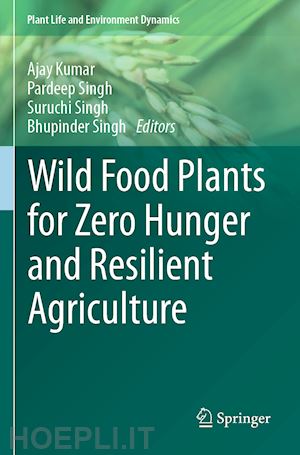
Questo prodotto usufruisce delle SPEDIZIONI GRATIS
selezionando l'opzione Corriere Veloce in fase di ordine.
Pagabile anche con Carta della cultura giovani e del merito, 18App Bonus Cultura e Carta del Docente
The edited volume brings out a comprehensive collection of information relevant to wild food plants, their importance for global sustainable food security, future-readiness, and resilient agriculture. The book's primary focus is to cover topics on the diversity of wild food plants across the globe, their nutraceutical importance, production-consumption trends, integration into the current food menu, and marketing and livelihood opportunities to the indigenous people. Sustainable development goals 1, 2, and 3 are significant for a poverty-free, hunger-free world and ensure good health and wellbeing of the people, respectively. The three goals are important and interlinked as achieving zero poverty will help reduce hunger among the people. Availability of nutritional and balanced food ensures good health. Wild food plants are an essential part of a nourishing and healthy diet for indigenous communities. They are globally collected from natural habitats or cultivated at more minor scales. Although consumed locally, they are an essential part of the diets of tribal and indigenous communities worldwide and hold immense potential to alleviate global hunger. Considering their importance for global sustainable food security, it is essential to clearly understand the future role of wild food plants for future readiness and resilient agriculture. Therefore, this book provides a piece of important information on these aspects. The book is a valuable resource for the audience ranging from undergraduate science students to the NGOs and institutions involved in poverty alleviation programs, policymakers, dieticians, horticulturists, plant breeders, farmers, health experts, and food enthusiasts.
Dr. Ajay Kumar is working as Assistant Professor of Plant Science at Central University of Kerala, India. He has obtained is PhD from School of Life Sciences, Jawaharlal Nehru University, New Delhi under the guidance of Dr. Nirala Ramchiary who is a renowned crop scientist. Dr. Ajay has more than six years of teaching and research experience and has published several papers, review articles and book chapters in reputed journals and books respectively. His areas of research include phytochemical genomics, wild food plants, traditional food systems, food security and abiotic stresses. He has been a member of Academic Council, Central University of Kerala in the past and currently he is the member of University Court. He has successfully guided more than 30 Post Graduate students for their dissertations.
Dr. Pardeep Singh is presently working as an Assistant professor (Department of Environmental Studies, PGDAV College University of Delhi, New Delhi,India). He has obtained his master’s degree from the Department of Environmental Science at Banaras Hindu University, Varanasi India and his doctorate degree from the Indian Institute of Technology (Banaras Hindu University) Varanasi. He has published more than 75 research articles in international journals in the field of Environmental management and edited more than 45 books.
Dr. Suruchi Singh is presently working as Faculty in the Department of Botany, Sunbeam College for Women, India. She obtained her PhD from Banaras Hindu University, India in Botany with Environmental Science as major field. Dr Singh received her postdoctoral experiences in Department of Botany, Banaras Hindu University under Council of Scientific and Industrial Research and Department of Science and Technology. She has published articles in various international journals and books series (>50 peer reviewed articles). In her research, she has identified processes and activities where environmental efficiencies of selected crop plants must be increased against UV-B and tropospheric Ozone.
Dr Bhupinder Singh Joined the Indian Council of Agricultural Research (ICAR) as a Scientist (Plant Physiology) in 1991 and was posted at the Nuclear Research Laboratory, Indian Agricultural Research Institute (IARI), New Delhi in 1992. Presently, he is working as a Principal Scientist and Head at the Centre for Environment Science and Climate Resilient Agriculture (CESCRA), ICAR-IARI. He is also discharging the additional responsibility of the Radiological Safety Officer (RSO), at the ICAR-IARI, New Delhi since 2006. He has more than 25 years of research and teaching experience and has focused his research pursuits in the Key area of nutriophysiology and radiophysiology. His scientific interests have helped in gaining insight into the role of phytosiderophore biosynthesis in improving Fe-Zn efficiency under limited nutrient availability and in phytoremediation of heavy metals. He has more than 90 research publications in reputed international and national journals. He has guided more than 13 PhD and MSc students and has several awards and recognitions to his credit such as ICAR-Lal Bahadur Shastri young scientist award, DST BOYSCAST fellowship, INSA-DAAD International scientific exchange fellowship, RD Asana gold medal, R.H. Dastur (AAAS) awards. His research pursuits have been supported by several of the funding agencies such as DST, ICAR, BARC, Tata Steel Ltd, Ministry of Steel, DBT etc. He is also a fellow of the Indian Society for Plant Physiology (ISPP) and was its elected Vice President for the years 2014-2015. He was a member of the Scientific panel on biological hazard (2009-2015); member, Scientific panel on the genetically modified organisms and foods (2015-2018) and Member of both Panels at FSSAI, Govt. of India (2019-2022).











Il sito utilizza cookie ed altri strumenti di tracciamento che raccolgono informazioni dal dispositivo dell’utente. Oltre ai cookie tecnici ed analitici aggregati, strettamente necessari per il funzionamento di questo sito web, previo consenso dell’utente possono essere installati cookie di profilazione e marketing e cookie dei social media. Cliccando su “Accetto tutti i cookie” saranno attivate tutte le categorie di cookie. Per accettare solo deterninate categorie di cookie, cliccare invece su “Impostazioni cookie”. Chiudendo il banner o continuando a navigare saranno installati solo cookie tecnici. Per maggiori dettagli, consultare la Cookie Policy.